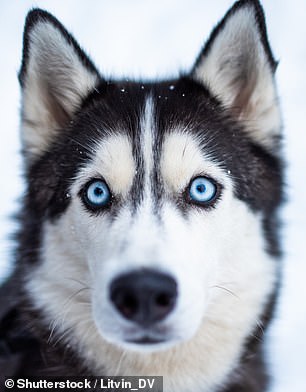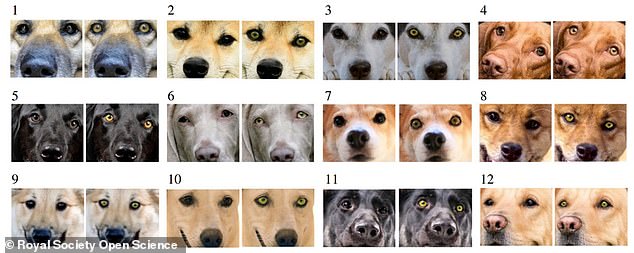Puppy dog eyes DO exist! Dogs are seen as more friendly and less threatening if they have dark eyes, study finds
- Dogs with dark eyes are perceived as friendlier and less threatening
- Experts say humans may have driven its popularity
Try as you might, it can seem almost impossible to say no to your puppy when he's looking at you pleadingly with his big brown eyes.
Now, a study has found that dogs with dark eyes are perceived as friendlier and less threatening.
Experts say humans may have driven its popularity.
All modern dogs are descended from wolves and have become “man's best friend” through thousands of years of domestication.
The most common eye color for wolves is yellow, and scientists wanted to know if humans had an influence on the eye color of their descendants today.

Experts have found that dogs with dark eyes are perceived as friendlier and less threatening, and humans may be the reason behind their popularity
The team, from Teiko University of Science in Japan, collected 22 images of gray wolves and 81 images of domestic dogs from 35 different breeds.
They found that dogs' irises were much darker compared to those of wolves, and were more likely to be brown than yellow.
They then collected 12 photos of dogs, including Labrador Retrievers, Vizslas and Welsh Corgis, and recolored their eyes either dark or yellow.
When they asked 76 participants to rate the photos, they found that dogs with dark eyes were friendlier and less threatening than the same dogs with light eyes.
“We speculate that a dark iris makes it difficult to distinguish pupil size, and thus gives the illusion of a large pupil, which is related to our perception of being more like infants,” said researcher Dr. Akitsugu Kono.

The researchers collected 12 photographs of dogs, including Labrador Retrievers, Vizslas, and Welsh Corgis, and recolored their eyes as either dark or yellow.
“Human studies show that humans rate those with dilated pupils as more friendly, attractive, and trustworthy.”
The researchers said dark eyes may elicit a “caregiving” response from humans, which led to the evolution of this trait in domesticated dogs.
“In conclusion, our results suggest that dogs' iris color is darker than that of wolves, and that dark dog eyes positively influence human perception of dogs,” they added in the journal Royal Society Open Science.
Dark-eyed dogs may have evolved by acquiring a facial trait that sends a non-threatening gaze signal to humans.
(Tags for translation) Daily Mail
